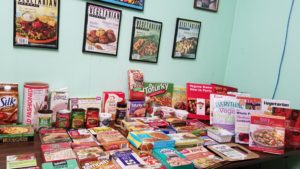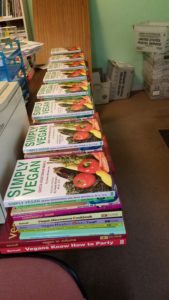Dietetic Intern Day
By Hannah Greene, Vegetarian Resource Group Intern
As a long-term vegetarian, living surrounded by a vegetarian family, I find it easy to forget that meatless diets are not the norm for most Americans. To those of us who have been vegetarian for many years, avoiding animal products is simply a fact of life.
When nine dietetic interns visited The Vegetarian Resource Group, I was reminded of the challenges and misconceptions faced by people who are considering a vegetarian diet. I realized how lucky I was to have an already-vegetarian, health-minded family when I became vegetarian, and how important it is to educate wannabe-vegans on how to make this transition healthfully.
On my first day as a VRG intern, nine dietetic interns from the University of Maryland visited our office to learn more about vegan and vegetarian diets. Their mentor/advisor is not a vegetarian, but she recognizes the value in exploring vegetarian diets. It was very important to talk to these interns about veganism, because it seems that their education curriculum had not given much consideration to vegan/vegetarian diets.
None of these dietetic interns were vegetarian, although one said she was formerly vegan. First, we defined vegan and vegetarian diets, and talked about how popular they have become in recent years. We discussed the relative ease with which one can follow a vegan diet today, compared to the limited options available when The Vegetarian Resource Group was created. We displayed a table full of vegan food products to show how many cruelty-free vegan foods are available.
Each of us discussed what we typically eat, and talked about our individual experiences becoming vegetarian/vegan. As they hadn’t had much experience with vegetarianism, the interns listened enthusiastically and were eager to learn more for their vegetarian future clients.
We discussed the many reasons one might become vegetarian, from religious traditions to a personal belief in nonviolence. I discussed the religious and cultural reasons one may or may not become vegetarian, based on my experiences living with a Hindu family when I was an exchange student in Malaysia last year. I described the widespread Hindu practice of being vegetarian during certain holidays and funerals (if not for their entire lives, as millions are). We mentioned the vegetarian beliefs of Seventh-day Adventists, along with Jains and some Buddhists. It was important to remind future dietitians of these cultural aspects of vegetarianism, so that they are mindful of potential religious beliefs when counseling patients.
We each talked about our own experiences as vegans/vegetarians. We included the hesitations we may have had when we first considered this diet, along with how we’ve met these challenges. We mentioned common misconceptions about veganism, like a belief that vegans cannot get enough protein to survive. I discussed being an athlete while vegetarian, and how it is not as much of a hassle as one might expect. VRG’s Volunteer Coordinator Gene told us about being vegan in Arkansas, evidence that one can maintain a healthy vegan diet almost everywhere! VRG’s Co-Director Debra explained raising vegan children, and I chimed in about being vegetarian in high school and the obstacles one might face. Debra also discussed vegan college students and athletes, showing that it is certainly possible.
We mentioned some ingredients to be mindful of, like gelatin and honey, which can make foods unexpectedly non-vegan. Avoiding these foods is an issue that most non-vegans would never think about, so it was important for VRG members to highlight these concerns and remind these future Registered Dietitians.
VRG’s Co-Director Charles discussed surveys about vegetarianism and reminded the interns how even the most seemingly scientific studies can often be misleading. We discussed the nutrients essential to all people, and how vegans are able to find these. The interns listed vegan sources of nutrients like B12, iron, and calcium. I learned that many foods give me nutrients I didn’t even realize!
Although many of us vegetarians take for granted the benefits of a meatless diet, most people don’t have this understanding, so it is critical to meet with the students who will soon dictate common dietary beliefs. The interns’ enthusiasm gives me a lot of hope for more vegan-friendly dietitians in the future.
Each dietetic intern prepared a vegan dish and brought it to the office, which we all shared. Their creations varied in complexity and food category, ranging from vegan banana bread to soba noodles. Some brought salads; chili; vegan protein balls; and microwavable instant meals.
After lunch, we broke into groups to brainstorm a one-day vegan meal plan for an individual on the Supplemental Nutrition Assistance Program. The meals had to be vegan, fulfill daily nutrition needs, and cost approximately the daily $6.00 allowance for SNAP. Here is one of the meal plans a group created, along with per-serving prices found online:
Breakfast:
Wheat bread $0.14
Peanut butter $0.10
Sliced banana $0.25
Soy milk $0.25
Lunch:
Long grain rice $0.25
Black beans: $0.50
Cucumber/tomato salad: $0.85
Peas $0.65
Dinner:
Homemade veggie burger $0.75
Whole grain tortilla $0.13
Soy milk $0.25
Succotash $0.92
This adds up to $5.04 (But price doesn’t include spices, flavor, dressing, salt, etc.) This activity served as evidence that veganism does not have to be expensive, time-consuming, or overly complicated!
Before the interns left, VRG gave them pamphlets about veganism, scientific position papers, and vegan cookbooks. The stack of cookbooks served as evidence of the wealth of opportunities to be vegan with ease, showing that vegan meal opportunities extend far beyond tofu and salad! The vegan cookbooks are going to be very important resources as the dietitians deal with patients considering adopting a vegan or vegetarian diet. With these resources, the future dietitians can guide patients in adopting or maintaining a compassionate, healthful diet.
For information about becoming a registered dietitian, see:
http://www.eatrightpro.org/resources/about-us/what-is-an-rdn-and-dtr/what-is-a-registered-dietitian-nutritionist
For information about Vegetarian Resource Group internships, see
http://www.vrg.org/student/index.php
To support The Vegetarian Resource Group education and outreach, donate at
www.vrg.org/donate
To join The Vegetarian Resource Group, go to
http://www.vrg.org/member/2013sv.php


